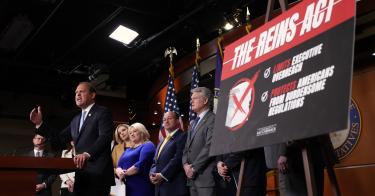Later this week, the U.S. House is scheduled to vote on an important measure that addresses the immense rule-making power of the administrative state and the threat that poses to our Constitution’s structure. The REINS Act, or Regulations from the Executive in Need of Scrutiny Act, would help limit Congress’s overly vast delegation of lawmaking power to the federal bureaucracy—delegation that threatens the core principle of self-government by elected representatives.
The basic idea of the REINS Act is simple: All “major rules” (those that have an annual economic impact of $100 million or more) do not take effect until and unless both houses of Congress pass a joint resolution to approve them. This change would ensure that members of Congress are accountable to the people who elected them for the costs and effects of the federal government’s regulations.
Some have attacked the idea behind the REINS Act—having members of Congress vote for regulations that function effectively the same as laws—as radical.
This criticism is mistaken. Even the early defenders of the administrative state, who cheered as Congress delegated vast lawmaking power to the bureaucracy, acknowledged the constitutional problem with it. The Constitution vests with Congress “all legislative powers” that are given to the federal government. Giving agencies the power to make regulations that carry the force and effect of law seems inconsistent with this constitutional command.
One of these early supporters of the administrative state, James Landis, who served as chairman of the Securities and Exchange Commission during the New Deal, proposed a solution to the constitutional problem: Allow agencies to propose the rules, but require Congress to vote on them before they become legally binding.
As he explained in a book called “The Administrative Process,” it would be a “simple device to have the administrative as the technical agent in the initiation of rules of conduct, yet at the same time have the legislative share in the responsibility for their adoption.”
He noted that this idea had been implemented in England, providing that “a regulation shall not become effective until Parliament by resolution approves it.” Landis—a staunch defender of the administrative state—was advocating something like the REINS Act.
Even the original defenders of the administrative state acknowledged that there were concerns that must be addressed in order to preserve the structure and character of our constitutional system. The basic idea of the REINS Act—that Congress should vote on the major rules that carry significant impact—is rooted in the core constitutional principle of self-government through elected representatives. This week, the House will consider whether to bring the administrative state more in line with that core principle.
This piece originally appeared in The Daily Signal



